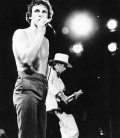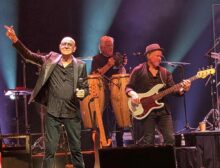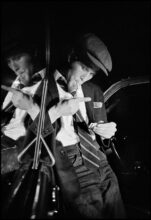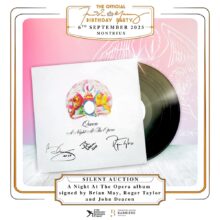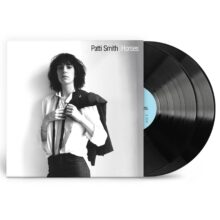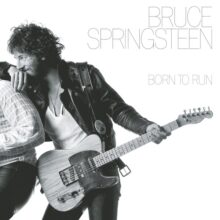Bruce Howe, the bass player for Fraternity, has died at the age of 77. Fraternity was a pioneering Aussie rock band with singers at various stages including Bon Scott (before AC/DC), Jimmy Barnes (before Cold Chisel) and Swanee.
Fraternity released their first single ‘Why Did It Have To Be Me’ in October 1970.
Fraternity’s lead singer was Bon Scott before he joined AC/DC. Bon had been with The Valentines. When they broke up, Bruce recruited him for Fraternity. Fraternity’s version of Blackfeather’s ‘Season of Change’ picked up airplay in South Australia and Victoria while the Blackfeather version was the hit in New South Wales.
A new version of the band formed in 1974 with John ‘Swanee’ Swan in lead vocals. Swanee switched to drums in 1975 and his brother Jimmy Barnes became the new lead singer for Fraternity (prior to Cold Chisel). Jimmy then left to form Cold Chisel. When they broke up Bruce Howe became the bass player for Jimmy’s solo band and played on Jimmy’s ‘Bodyswerve’ and ‘For The Working Class Man’ albums.
Fraternity have released the following Obituary:
BRUCE HOWE
17th March 1947 – 29th January 2025
We are deeply saddened to share the news of the loss of our bandmate, Bruce Howe. He passed away on January 29, 2025, in Semaphore, South Australia, close to his cherished Larg’s Pier Hotel, following a prolonged struggle with health issues.
Bruce was best known for being the bassist in Fraternity, Mickey Finn and Jimmy Barnes Band. He is the rhythmic heart beat in such songs you hear on the radio everyday as Fraternity’s ‘Seasons of Change’ (Charted #1 1971), ‘If You Got It’ (Charted #1 1971) and Jimmy Barnes’ ‘No Second Prize’ (Charted #12 1984), ‘Daylight’ (Charted #12 1985), ‘I’d Die To Be With You Tonight’ (Charted #7 1985), and ‘Working Class Man’ (Charted #5 1985).
Bruce Howe was raised in Port Adelaide and began his musical journey in high school with a band named The Fugitives. While most of his peers opted for the guitar, Bruce chose to experiment with the bass guitar, a decision that defined his musical path. He quickly transitioned to another band called The Embers and subsequently joined Tweed Harris’ ensemble, The Clefs.
During the emerging rock n’ roll scene of the mid-1960s, The Clefs gained popularity in Adelaide before relocating to Melbourne, featuring Barrie McAskill as lead vocalist. During his tenure with The Clefs, Bruce collaborated with singer Bev Harrell. Bruce returned to Adelaide and in the meantime The Clefs’ line-up changed and eventually transformed into Levi Smith’s Clefs, now led by Barrie McAskill. Barrie invited Bruce to join this new formation after the previous backing band departed to create the progressive rock band Tully.
The lineup of Levi Smith’s Clefs settled with Barrie McAskill (lead vocals), Bruce Howe (bass), Mick Jurd (guitar), John Bisset (keyboards), and Tony Buettel (drums). The band enjoyed a successful residency at the Whiskey Au Go Go, performing to American R&R Vietnam soldiers in Sydney, and recorded the acclaimed album Empty Monkey. With Levi Smith’s Clefs, Bruce performed at Australia’s first outdoor rock festival, Ourimbah. Following a move to Melbourne, the band decided to part ways with Barrie McAskill and transformed into a four-piece group known as Fraternity, relocating back to Sydney. During this period, Bruce secured a residency for Fraternity at Jonathan’s Nightclub where he met his wife Anne (d. 2023). Bruce subsequently extended an invitation to Bon Scott, who was the co-lead vocalist of The Valentines, to become a member of Fraternity, expanding the group to five members. Shortly thereafter, John Freeman assumed the role of drummer. Following the release of their initial single, “Why Did It Have To Be Me?”, Fraternity supported Jerry Lee Lewis during his tour of Australia in 1970.
Fraternity entered into an agreement with music promoter and manager Hamish Henry and his company The Grape Organisation, who relocated the band to Adelaide, South Australia. Under Henry’s guidance, they headlined Henry’s 1971 Myponga Music Festival, sharing the stage with Black Sabbath and the 1972 Meadow’s Technicolour Fair with Mary Hopkin, Tom Paxton, and Edison Lighthouse. The group quickly rose to prominence in Australia, releasing two albums: Livestock and Flaming Galah, plus backing Doug Ashdown on his Age of Mouse LP. They achieved multiple top 10 singles, including chart-toppers ‘Seasons of Change’ and ‘If You Got It’, both of which were showcased at the esteemed Hoadley’s Battle of the Sounds competition, where they triumphed against Sherbet and Jeff St John and the Copperwine in August 1971. Additionally, Channel Nine’s MOVE, hosted by Vince Lovegrove, aired the first primetime national television special devoted to a rock band on Fraternity. By this time, Harmonica extraordinaire Uncle John Eyers and Sam See had joined the group to make it a seven piece. As one of Australia’s top acts Fraternity would take the stage with well-known international bands such as Deep Purple, Free, and Manfred Mann at Apollo Stadium. Bruce and Fraternity embarked on an extensive South Australian country tour organised by the Country Arts Association. This was the Country Arts Association’s first collaboration with a rock band, culminating in a notable performance with the Melbourne Symphony Orchestra during the 1972 Adelaide Festival of Arts. In mid-1972, Hamish Henry relocated the band to London, where they performed on bills with bands such as Status Quo, Mungo Jerry, Pink Fairies and eerily met Bon Scott’s later successor in AC/DC, Brian Johnson whilst performing with Geordie. Whilst in London, Bruce’s wife Anne gave birth to their son, JJ. Ultimately, Fraternity disbanded by the end of 1973.
Upon returning to Australia, Bruce worked with Bon on the docks of Port Adelaide. Fraternity would be on definite hiatus when Bon severely injured himself in a motorcycle accident. While Bon was recuperating, he encountered and subsequently became a part of AC/DC, eventually inviting Bruce to join him. Now with a young family and firmly re-established in his home town, Bruce turned down the offer. Bruce established Fraternity MK II, and just as he had done with Bon Scott, he began mentoring a new vocalist, Jimmy Barnes, and his brother John Swan on drums. After Jimmy rejoined Cold Chisel in 1975, Bruce formed a popular jazz-rock group named Some Dream, featuring former members of Fraternity.
After Some Dream disbanded, Bruce joined the hard rock group Mickey Finn, which had been formed by Fraternity’s Uncle John Eyers and Fraternity MK II’s guitarist Mauri Berg. Bruce found considerable success with Mickey Finn, at times performing for estimated outdoor audiences of 40,000 to 50,000, including a major concert in Elder Park for radio station SA/FM to kick off 1984 alongside Swanee and The Dukes. Simultaneously, in late 1983, Bruce was invited to join Jimmy Barnes’ solo band, contributing to the albums Bodyswerve and For The Working Class Man and their accompanying tours.
Jimmy Barnes: “I needed players I felt safe with – players who, like the guys in Cold Chisel, had been around…I approached the most influential musician in my life besides Don Walker, Bruce Howe. He had a style like no one else I’ve worked with, as far as I could tell. Bruce only played upstrokes on his bass, so his sound was very aggressive. He was tough and demanding but he encouraged me to drag out more of myself. I can’t thank Bruce enough for working with me after I left Cold Chisel. He was the one musician I needed around me at that crucial time in my life. In years to come my kids called him ‘Big Old Bruce’. He was mean and tough and a bit scary but soft as a marshmallow, once you gained his trust.”
During his time with Barnes, he met Rockin’ Rob Riley, a former guitarist for Rose Tattoo, and together they formed their own band, Megaboys, with Steve Mac McLennan on drums. Mickey Finn disbanded in 1991, but Megaboys continued to perform throughout the 1990s.
Recently, Bruce continued to work with Victor Marshall, co-director of Bruce’s longtime management, The Grape Organisation, alongside Fraternity’s original manager Hamish Henry on the band’s biography, releasing unheard archive material and filming an ABC documentary for Australian Story, Bon Scott: On The Brink, viewed by millions of people worldwide.
Victor Marshall: “Bruce was lovingly referred to as ‘The Dingo’ and often described his bandmates as his ‘Fraternity family.’ We take immense pride in Bruce’s achievements in music and his steadfast dedication to those he cherished. Bruce Howe has left a lasting mark on Australian music, having contributed to many iconic tracks that serve as the backdrop to our lives. He played a crucial role in guiding some of the nation’s most renowned rock front men, including Bon Scott and Jimmy Barnes, as well as a multitude of other artists. In his musical pursuits, Bruce aimed for excellence, and his tireless work ethic drove him and those he worked with to success. We will miss him deeply and continue to celebrate his musical legacy.”
Bruce is survived by his son, JJ, along with his grandchildren, Jack and Jasmin. Our thoughts and love are with them during this time.
For more about Bruce Howe visit the Fraternity website
Stay updated with your free Noise11.com daily music news email alert. Subscribe to Noise11 Music News here
Be the first to see NOISE11.com’s newest interviews and special features on YOUTUBE and updated regularly. See things first SUBSCRIBE here: Noise11 on YouTube SUBSCRIBE
Noise11 is now on Bluesky. Follow us at


